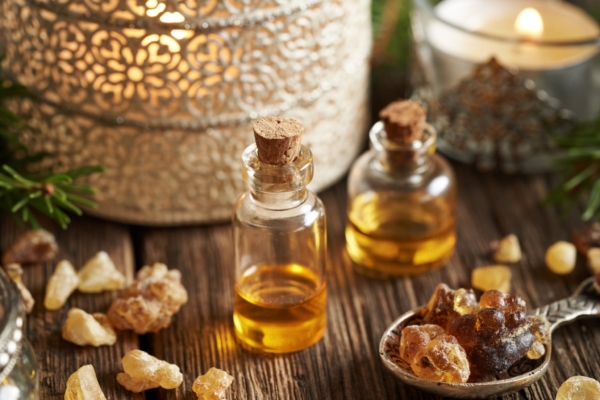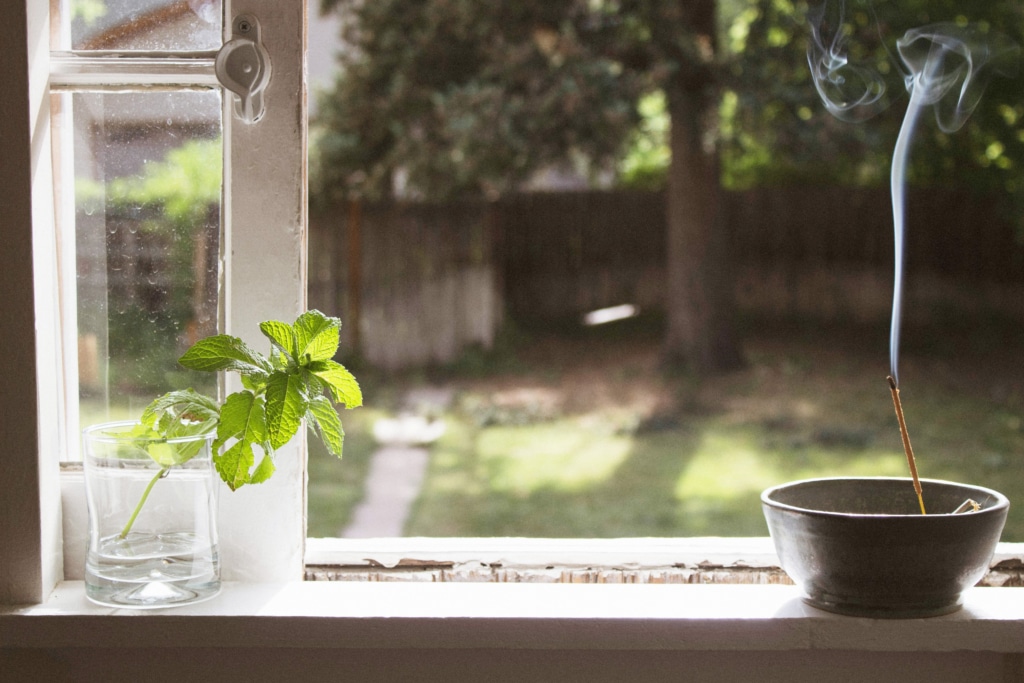
Turn on the news, scroll through social media, or simply glance at your to-do list, and it’s clear – stress has become an unavoidable part of modern life. From the pressures of work and family responsibilities to the constant buzz of notifications, our world today rarely offers a moment of peace. The weight of daily stress can feel overwhelming, leaving us exhausted, anxious, and searching for relief.
But what if there was a way to pause the chaos? A simple, natural remedy that has been used for centuries to soothe the mind and body? Aromatic medicine, the practice of using aromatic plants for healing, offers just that – a way to quiet the nervous system, ease tension, and invite serenity into our daily routines.
Science is catching up to what ancient traditions have long understood: aroma has a profound effect on the brain. When we inhale the scents of aromatic plants like Lavender, Rosemary, or Frankincense, the molecules interact with our limbic system – the part of the brain responsible for emotions and stress regulation. Studies have shown that certain aromatic plants can lower cortisol levels, slow heart rate, and even enhance mood, making aromatherapy a powerful tool for stress relief. [1] [2] [3]
In this article, we’ll explore how aromatherapy works to calm the mind, common aromatics used in aromatherapy for stress relief, and simple yet effective ways to incorporate these botanicals into your daily life. Whether you need a moment of tranquility in the middle of a hectic day or a deeper sense of peace before bed, aromatic medicine can help you reclaim a sense of balance – one breath at a time.
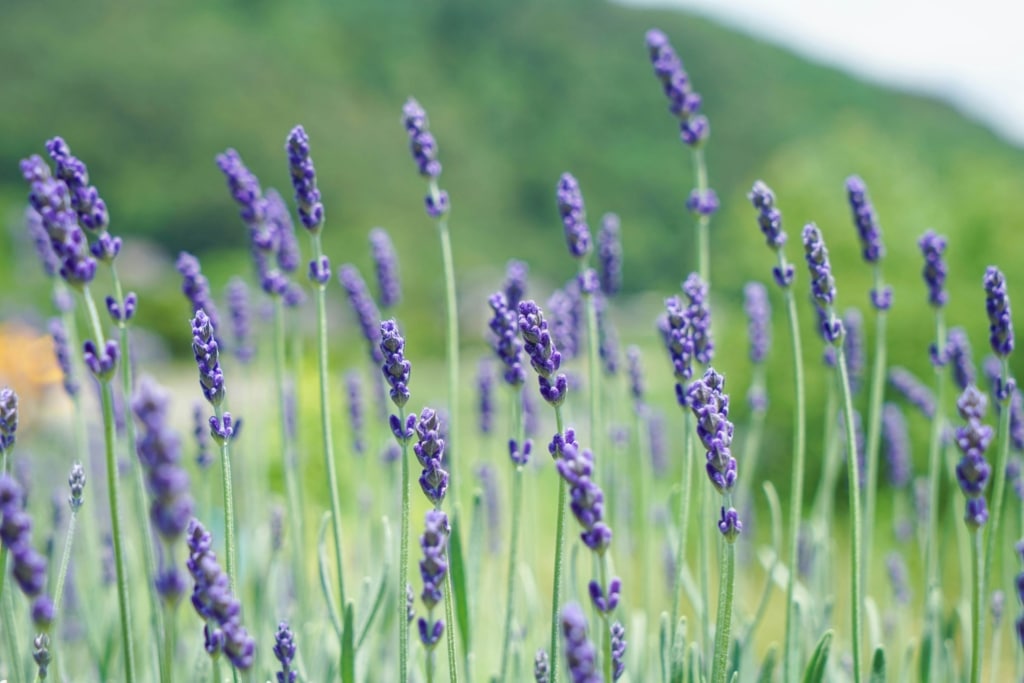
How Does Aromatherapy Relieve Stress?
Aromatherapy and stress relief have long been interconnected. Aromatherapy soothes stress by directly influencing the brain’s limbic system, which governs emotions, memory, and stress regulation. When we inhale the scent of an aromatic plant, its molecules travel through the olfactory system, triggering responses in the amygdala and hypothalamus – key areas involved in emotional processing and the body’s stress response. This stimulation prompts the hypothalamus to release feel-good chemicals like serotonin, helping to balance mood and promote relaxation.
Depending on the plant, aromatic botanicals can ease tension, uplift the spirit, and create a profound sense of calm. This is why certain scents, like Lavender, can evoke feelings of serenity and relaxation almost instantly. The power of scent to shift emotional states is deeply rooted in both biology and psychology, explaining why aromatherapy has been used for centuries as a tool for stress relief.
Scientific studies support the effectiveness of aromatherapy for stress relief. Research suggests that certain aromatic plants can lower cortisol, the body’s primary stress hormone, helping to ease tension and promote a sense of calm [2]. Inhaling Ylang-Ylang, for example, has been found to slow heart rate, reduce blood pressure, and activate the parasympathetic nervous system – the "rest and digest" state that counters the effects of stress [4].
By directly influencing the nervous system, aromatherapy offers a natural and effective way to relieve stress, making it more than just a pleasant fragrance – it’s a scientifically backed, timeless tool for emotional well-being. Let’s explore some of the most popular aromatic plants used in aromatherapy for stress relief.
5 Aromatic Plants & Essential Oils That Relieve Stress

Frankincense (Boswellia spp.)
Frankincense is one of the oldest and most widely used incenses in the world, revered for its profound effects on physical, emotional, and mental health. For centuries, it has played a key role in Traditional Chinese Medicine, Tibetan Medicine, Ayurveda, and various cultural healing systems to ease nervous tension, stress, anxiety, depression, and insomnia. Known for its grounding and soothing properties, Frankincense is commonly incorporated into meditation and spiritual ceremonies to calm the mind, support the nervous system, and enhance mental clarity. (Click here to learn more about aromatherapy for anxiety.)
Scientific research supports its traditional use, with one study finding that an aromatic compound in Frankincense reduced anxiety and depression-like behaviors in mice [5]. This suggests that burning Frankincense as incense may help alleviate emotional stress and promote a sense of balance. While these findings are promising, further studies on humans are needed to understand its therapeutic potential fully.
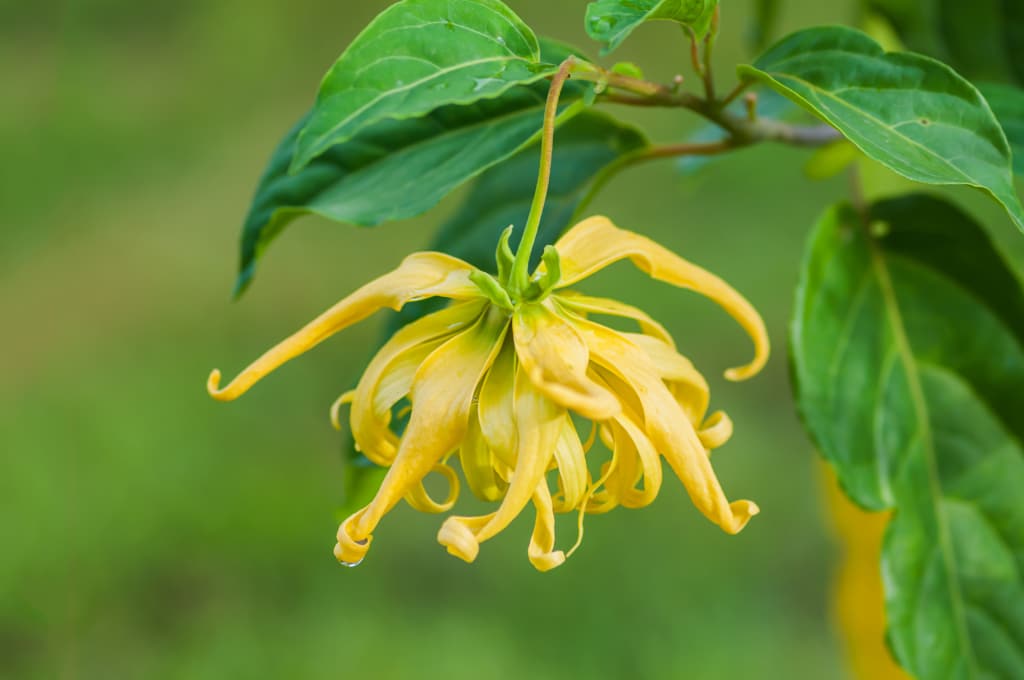
Ylang Ylang (Cananga odorata)
Ylang Ylang is renowned for its calming, relaxing, and stress-relieving properties. Its soothing aroma helps ease stress, tension, anxiety, a racing heart, and sleep difficulties. Due to its strong connection to stress relief, Ylang Ylang has been the subject of numerous clinical studies exploring its impact on the nervous system and emotional well-being [4]. In aromatherapy, Ylang Ylang has traditionally been used to support those struggling with insomnia, nervous tension, chronic stress, physical exhaustion, fatigue, and depression. Its deeply relaxing qualities make it a powerful plant in promoting emotional balance and overall well-being.
Rosemary (Salvia rosmarinus)
Rosemary’s uplifting aroma sweeps away stress, discouragement, pessimism, and mental fog, creating space for clarity and fresh energy. Like a cleansing broom, it clears emotional stagnation and promotes a sense of renewal. If you find yourself stuck in indecision or negative thought patterns, inviting Rosemary into your life can help restore focus and optimism.
Scientific studies suggest that Rosemary’s scent can reduce anxiety, depression, and cortisol levels – the body's primary stress hormone [2]. Elevated cortisol triggers the fight-or-flight response, contributing to chronic stress and long-term health issues. By calming this response, Rosemary supports emotional well-being, easing feelings of disconnection and exhaustion. Long revered as a remedy for emotional heaviness, it gently encourages vitality, resilience, and a renewed sense of direction.
Unlock Your Free Rosemary Issue Of...
🌿 The Aromatic Medicine Garden Membership 🌿
Curious to discover how Rosemary can help reduce stress, boost mental clarity, and offer so much more? Ready for a deeper, holistic exploration of the fascinating world of aromatic plants? Experience our membership with a free sneak peek issue, including an hour-long plant talk and a 21-page plant monograph PDF packed with recipes and insights.

Rose (Rosa spp.)
In aromatherapy, Rose is revered as a gentle tonic for both the heart and mind. Like a warm embrace, Rose calms and supports the heart while restoring a deep sense of comfort to the body, mind, and spirit. Rose is known for its soothing effects on the nervous system, helping to ease feelings of hopelessness, anxiety, insomnia, and even a racing heart.
This emotionally nurturing aroma encourages relaxation, inviting a deep sigh of relief and creating space for positivity. Rose is not only uplifting but also heart-opening, cultivating a deeper connection with oneself and others in a loving, compassionate way. Research has shown that Rose essential oil has a calming effect on the body, helping to lower blood pressure, cortisol levels, heart rate, and blood oxygen levels – effectively easing stress and alleviating symptoms of depression [6].
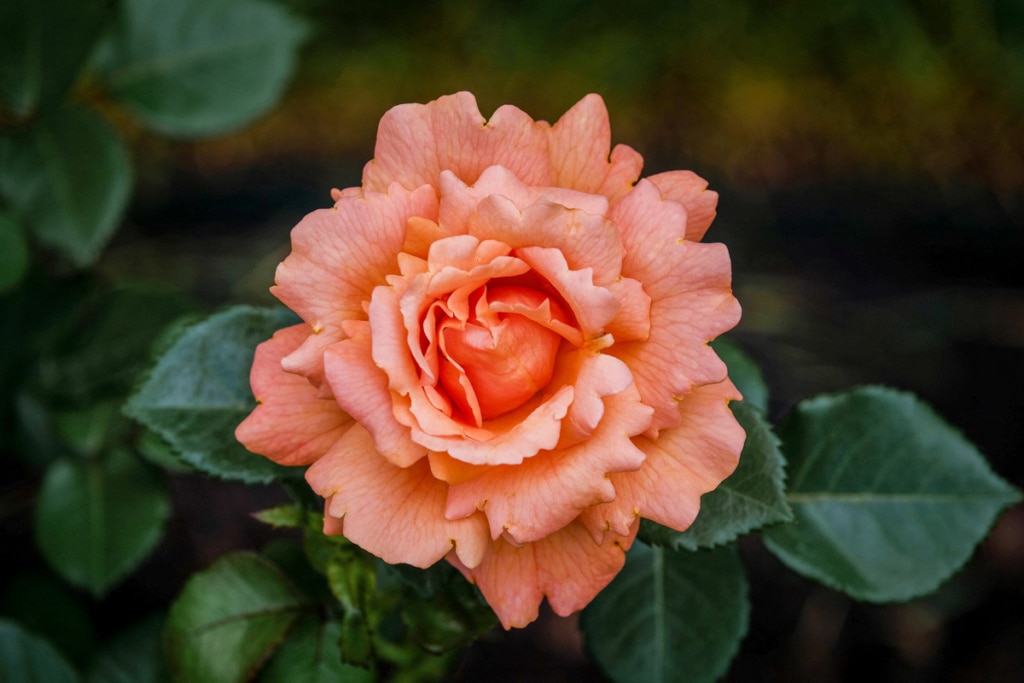
Lavender (Lavandula spp.)
For centuries, Lavender has been revered in both herbalism and aromatherapy for its soothing and calming effects on the nervous system. A vast body of scientific research has confirmed that Lavender’s aromatic compounds help reduce stress levels [7]. Its natural antidepressant properties make it particularly effective in easing restlessness, anxiety, and emotional strain that often accompanies stress.
Lavender is both calming and fortifying to the nerves, helping to uplift the mood and stabilize emotions. Known for its sedative qualities, it has long been used to promote restful sleep and alleviate insomnia. As a cephalic herb, Lavender influences the central nervous system, offering an invigorating boost to cognition and enhancing mental clarity. It is especially beneficial when stress, anxiety, or depression cloud the mind, helping to restore grounding and balance to both mental and emotional well-being.

How to Use Aromatherapy for Stress Relief
The practice of aromatherapy is just one aspect of aromatic medicine. Aromatherapy utilizes essential oils to enhance health and well-being, while aromatic medicine takes a more holistic approach with a broad range of applications. Here are some of our favorite ways to incorporate aromatic medicine into your daily routine:
Natural Incense: As the original form of aromatherapy, natural incense made from pure aromatic plants offers a soothing experience for the mind and body. Ensure you’re burning all-natural incense free from synthetic fragrances and chemicals for the most therapeutic benefits.
Essential Oil Diffusion: Use essential oil diffusers to create a calming atmosphere in your home or workspace. For the best results, choose high-quality, sustainable essential oils, such as those from Aromatics International.
Topical Application: Blend essential oils with carrier oils for soothing topical use, such as in massages or on pulse points. Note: Most essential oils need to be diluted to prevent skin irritation or sensitization. For proper dilution guidance, check out our Essential Oil Dilution Chart.
Aromatic Herbal Baths: Add aromatic plants or essential oils to warm baths for the ultimate relaxation experience. For tips on mixing essential oils with bath water, visit our Herbal Bathing article.
Herbal Steaming: A time-honored tradition, herbal steaming involves steeping aromatic plants in hot water to release their compounds into the air, creating a soothing atmosphere.
Hydrosols: A hydrosol is a water-based byproduct of the distillation process used to extract essential oils from plants, containing the water-soluble components of the plant along with small amounts of essential oil. These can be sprayed on your body or in the air for a milder yet effective aromatherapy experience.
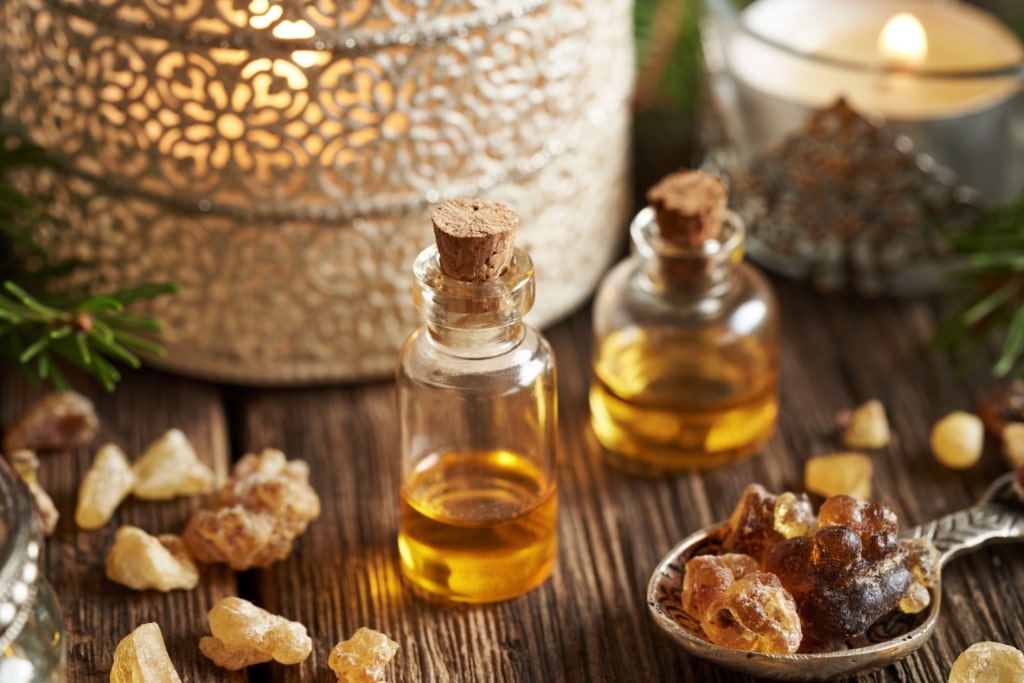
Does Aromatherapy for Stress Relief Really Work?
Yes, aromatherapy for stress relief truly works – but it’s also essential to address the root causes of your stress. Imagine standing on a beach during a raging storm, waves crashing over you again and again. Until you build a barrier or find your way out of the storm, the waves won’t stop. Similarly, stress affects many aspects of life, and identifying its sources can help lessen its impact.
Aromatherapy can be even more powerful when combined with other self-care practices such as meditation, breathwork, bodywork, yoga, journaling, nature walks, or therapy. Developing healthy coping mechanisms and lifestyle habits that resonate with you can create a more sustainable sense of balance and well-being. To explore this topic further, check out our article: Addressing Stress & Anxiety with Aromatic Medicine & Mindfulness.
Aromatic medicine has the power to profoundly support emotional and mental well-being. Beyond the 5 herbs covered in this article, many other aromatic plants are widely used in aromatherapy for stress relief, such as Bergamot, Clary Sage, Chamomile, Vetiver, Geranium, Sandalwood, Jasmine, and more. You may find that some aromas resonate with you more than others, so it's worth experimenting with different plants and methods to discover what works best for you. Choose an aromatic plant that speaks to you and try incorporating it into your bedtime routine – embrace the experience and witness what magic unfolds!

Dive into the ancient world of aromatic plants with the Materia Aromatica ebook, an in-depth guide to the therapeutic, spiritual, and aesthetic uses of the world's favorite incense plants. This rare resource offers detailed plant profiles and explores how incense has been used across cultures for healing, ritual, and pleasure for ages.
Article Written By Melissa Szaro

References
1. Chuang, K.J., Chen, H.W., Liu, I.J., Chuang, H.C., & Lin, L.Y. (2014). The effect of essential oil on heart rate and blood pressure among solus por aqua workers. Eur J Prev Cardiol. Jul;21(7):823-8. https://pubmed.ncbi.nlm.nih.gov/23197402/
2. Atsumi, T., Tonosaki, K. (2007). Smelling lavender and rosemary increases free radical scavenging activity and decreases cortisol level in saliva. Psychiatry Res. Feb 28;150(1):89-96. https://pubmed.ncbi.nlm.nih.gov/17291597/
3. Barati, F., Nasiri, A., Akbari, N., & Sharifzadeh, G. (2016). The Effect of Aromatherapy on Anxiety in Patients. Nephrourol Mon. Jul 31;8(5):e38347. https://pmc.ncbi.nlm.nih.gov/articles/PMC5111093/
4. Jung, D.J., Cha, J.Y., Kim, S.E., Ko, I.G., & Jee, Y.S. (2013). Effects of Ylang-Ylang aroma on blood pressure and heart rate in healthy men. J Exerc Rehabil. Apr;9(2):250-5. https://pmc.ncbi.nlm.nih.gov/articles/PMC3836517/#sec8
5. Burning Incense is Psychoactive: New Class of Antidepressants Might be Right Under Our Noses. (2008). Science Daily. www.sciencedaily.com/releases/2008/05/080520110415.htm
6. Hongratanaworakit, T. (2009). Relaxing effect of rose oil on humans. Nat Prod Commun. Feb;4(2):291-6. PMID: 19370942. https://pubmed.ncbi.nlm.nih.gov/19370942/
© 2025 The Northwest School of Aromatic Medicine. All rights reserved.
*The statements above have not been evaluated by the FDA, and are for educational purposes only. This article is not intended to diagnose, treat, cure, or prevent any disease. This article should not be taken as medical advice. Please consult your physician before you use this information for health purposes.
